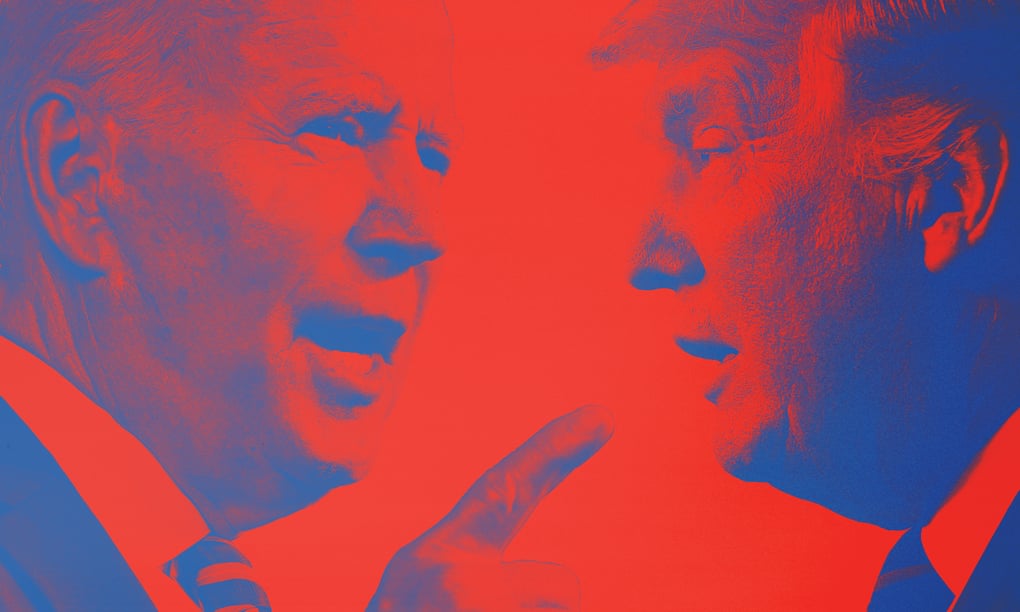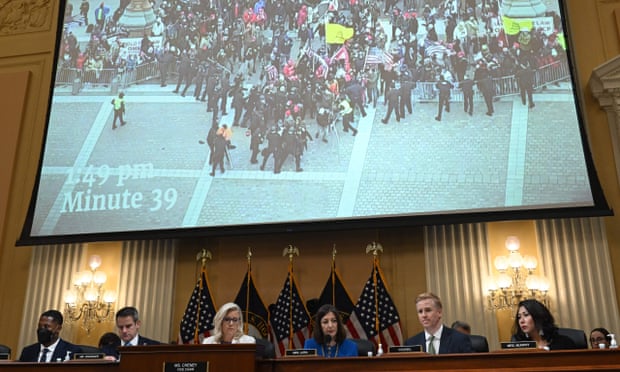The US president has been struggling and his divisive rival still has the Republican party in his grip. But there are reasons for hope

Illustration by Guardian design; Saul Loeb/AFP/Getty; Brendan Smialowski/AFP/Getty
Robert Reich
Mon 8 Aug 2022
Will Joe Biden be re-elected in 2024? With his current approval rating in the cellar, most pundits assume he will be toast by the next presidential election. At 81, he would also be the oldest person ever elected president, slightly exceeding the typical American’s lifespan.
So, the conventional thinking goes, Biden will be demolished by Donald Trump (or a Trump surrogate such as the Texas senator Ted Cruz or the Florida governor Ron DeSantis), thereby subjecting the US and the world to an even crazier authoritarian than Trump 1.0.
But that’s way too simplistic. In reality, Biden’s current approval rating isn’t much different from Ronald Reagan’s about this point in his presidency when he was grappling with inflation and the inevitable buyer’s remorse that voters feel a year and a half into a presidency. Two and a half years later, Reagan had won 49 states in his re-election bid against Walter Mondale. (Reagan was then 73, just short of the typical American’s lifespan at the time.)
Trump’s popularity has plummeted since the 2020 election – a casualty not just of most Americans’ outrage at his big lie that the 2020 election was stolen from him and his role in the January 6 insurrection, but also of the poor showing (and terrifying
characteristics) of many of his endorsees in recent Republican primaries. The televised hearings by Congress’s select committee investigating January 6 have also reduced Trump’s standing with most voters.
Meanwhile, Biden is scoring some legislative victories, including a major bill to subsidise semiconductor chip making in the US. And now, following a hard won Senate vote at the weekend, Biden has substantial bragging rights over a much larger bill to slow climate change, lower the cost of prescription drugs and make health insurance more affordable.
Advertisement
The president has also been getting kudos for the killing of Ayman al-Zawahiri, the al-Qaida successor to Osama bin Laden, in a spectacularly discreet US drone strike that resulted in no other casualties.
Yet a basic problem remains for Biden. The Democratic party he knew when he was elected to the Senate 50 years ago, from blue-collar, working-class Delaware, is not the Democratic party that elected him in 2020. It’s now largely composed of young adults, college-educated voters and people of colour.
In the intervening years, many working-class white voters who were once loyal Democrats joined the Republican party. As their wages stagnated and their jobs grew insecure, the Republican party skilfully and cynically channelled their economic frustrations into animus toward immigrants, Black people and Latinos, LGBTQ people, and “coastal elites” who want to control guns and permit abortions.
These so-called culture wars have served to distract such voters from the brute fact that the Republican party has zero ideas to reverse the economic trends that left the working class behind.
The wars have also distracted attention from the near record shares of national income and wealth that have shifted to the top; as well as the Republicans’ role in tax cuts on the wealthy, their attacks on labour unions and refusals to support social benefits that have become standard in most other advanced nations (such as paid sick and family leave, universal healthcare and generous unemployment insurance).
During his 36 years in the Senate, followed by eight as Barack Obama’s vice-president, Biden surely became aware of the loss of these working-class voters. And he must have known of the Democrats’ failure to reverse the trends that left them behind and regain their loyalty.
Democratic administrations expanded public health insurance, to be sure. But they also embraced global trade and financial deregulation, took a hands-off approach to corporate mergers, bailed out Wall Street and gave corporations free rein to bash labour unions (reducing the unionised portion of the private-sector workforce during the past half century from a third to 6%). It was a huge error – politically, economically and, one might even say, morally.
What accounted for this error? I saw it up close: the Democratic party’s growing dependence on campaign money from big corporations, Wall Street and wealthy Americans – whose “donations” to both parties soared.
Bill Clinton styled himself a “new Democrat” who would govern from above the old political divides – “triangulate”, in the parlance of his pollster, Dick Morris. In practice, he auctioned off the White House’s Lincoln bedroom to the highest bidders, made Wall Street’s Robert Rubin his chief economic adviser, advocated and signed the North American Free Trade Agreement, opened the US to Chinese exports and cleared the way for Wall Street to gamble.

‘The televised hearings have also reduced Trump’s standing with most voters.’ A House select committee hearing on 21 July.
Photograph: Saul Loeb/AFP/Getty Images
Obama brought into his administration even more Wall Street alumni and made Larry Summers his chief economic adviser. Obama promptly bailed out the banks when their gambling threatened the entire economy, but asked nothing of them in return. Millions of Americans lost their homes, jobs and savings, yet not a single top Wall Street official went to jail.
Small wonder that by 2016 two political outsiders gave dramatic expression to the populist bitterness that had been growing – Bernie Sanders on the left and Donald Trump on the right. At the time, they even spoke the same language – complaining of a “rigged system” and a corrupt political establishment, and promising fundamental change.
Biden saw all this unfold. He came to publicly regret his vote to ease banking rules. He never celebrated the virtue of free markets. He has been far closer to organised labour and more comfortable with non-college working-class voters than either Clinton or Obama. “I am a union man, period,” he has repeatedly said.
He’s no free trader, either. Biden proposed relocating supply chains for pharmaceuticals, semiconductors and medical supplies to the US, and imposing tax penalties on companies that relocate jobs abroad and credits for those that bring them home. He has kept in place most of the trade restrictions that Trump placed on China.
During the 2020 presidential campaign Biden was billed as a “centrist” seeking bipartisan solutions. But he had big, non-centrist ambitions. Seeking to be a “transformative” president, he openly sought a New Deal-style presidency. Once in office, he proposed the largest social agenda in recent American history.
That Biden failed to get much of this agenda passed in his first term was due less to his own inadequacies than to the Democrats’ razor-thin congressional majorities, and the party’s own compromised position within the power structure of the US.
But Biden’s and the Democrats’ deepest challenge was, and continues to be, voters’ distrust of the system. All political and economic systems depend fundamentally on people’s trust that its processes are free from bias and its outcomes are fair. Trump’s lie that the 2020 election was stolen from him has contributed to the distrust but is not responsible for it. Only about a third of Americans believe him.
The real source of distrust is the same force that ushered Trump into the White House in 2016: four decades of near stagnant wages, widening inequality, a shrinking middle class, ever more concentrated wealth at the top and growing corruption in the form of campaign cash from the wealthy and corporations.
If Democrats retain control of Congress in the upcoming midterm elections (possible but unlikely, given the usual pattern in which the party in control loses it), Biden could still become a transformative president in the last two years of his first term if he focuses like a laser on reversing these trends. Even if Democrats do not hold on to Congress, Biden could be a moral voice for why these trends must be reversed and the system transformed. It is the president’s best hope for being re-elected in 2024.
Robert Reich, a former US secretary of labor, is professor of public policy at the University of California at Berkeley
Obama brought into his administration even more Wall Street alumni and made Larry Summers his chief economic adviser. Obama promptly bailed out the banks when their gambling threatened the entire economy, but asked nothing of them in return. Millions of Americans lost their homes, jobs and savings, yet not a single top Wall Street official went to jail.
Small wonder that by 2016 two political outsiders gave dramatic expression to the populist bitterness that had been growing – Bernie Sanders on the left and Donald Trump on the right. At the time, they even spoke the same language – complaining of a “rigged system” and a corrupt political establishment, and promising fundamental change.
Biden saw all this unfold. He came to publicly regret his vote to ease banking rules. He never celebrated the virtue of free markets. He has been far closer to organised labour and more comfortable with non-college working-class voters than either Clinton or Obama. “I am a union man, period,” he has repeatedly said.
He’s no free trader, either. Biden proposed relocating supply chains for pharmaceuticals, semiconductors and medical supplies to the US, and imposing tax penalties on companies that relocate jobs abroad and credits for those that bring them home. He has kept in place most of the trade restrictions that Trump placed on China.
During the 2020 presidential campaign Biden was billed as a “centrist” seeking bipartisan solutions. But he had big, non-centrist ambitions. Seeking to be a “transformative” president, he openly sought a New Deal-style presidency. Once in office, he proposed the largest social agenda in recent American history.
That Biden failed to get much of this agenda passed in his first term was due less to his own inadequacies than to the Democrats’ razor-thin congressional majorities, and the party’s own compromised position within the power structure of the US.
But Biden’s and the Democrats’ deepest challenge was, and continues to be, voters’ distrust of the system. All political and economic systems depend fundamentally on people’s trust that its processes are free from bias and its outcomes are fair. Trump’s lie that the 2020 election was stolen from him has contributed to the distrust but is not responsible for it. Only about a third of Americans believe him.
The real source of distrust is the same force that ushered Trump into the White House in 2016: four decades of near stagnant wages, widening inequality, a shrinking middle class, ever more concentrated wealth at the top and growing corruption in the form of campaign cash from the wealthy and corporations.
If Democrats retain control of Congress in the upcoming midterm elections (possible but unlikely, given the usual pattern in which the party in control loses it), Biden could still become a transformative president in the last two years of his first term if he focuses like a laser on reversing these trends. Even if Democrats do not hold on to Congress, Biden could be a moral voice for why these trends must be reversed and the system transformed. It is the president’s best hope for being re-elected in 2024.
Robert Reich, a former US secretary of labor, is professor of public policy at the University of California at Berkeley
No comments:
Post a Comment